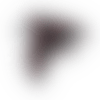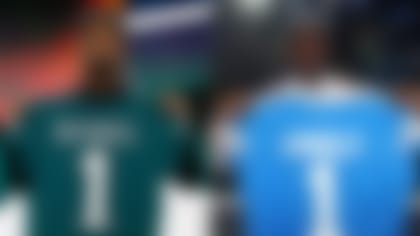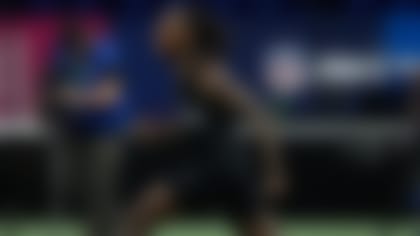It's that time of year again: The NFL free agency negotiating window opens at noon ET on Monday, March 11, with contract signings becoming official when the new league year begins at 4 p.m. ET on Wednesday, March 13. This marks the first phase of player movement during the offseason, as franchises look to address their rosters' most pressing needs. Before the frenzy begins, the Next Gen Stats analytics team delves into the three biggest needs for each of the 32 NFL teams.
Below, we hit the NFC. (Click here for the AFC rundown.)
NOTE: All cap figures pulled from at 12:45 p.m. ET on Friday, March 8.

- Needs: WR, CB, DL
- Cap space: $56,632,512
The Cardinals have to Kyler Murray as their franchise quarterback, meaning it's time to give him as much help as possible. Even if Arizona ends up replacing free agent Hollywood Brown via the fourth overall pick in April, a plethora of cap space should enable to the team to add depth at receiver and along the offensive line. Most of that capital, however, should be used to bolster the pass rush of a defense that ranked 29th in pressure rate (31.9 percent) and 26th in sack rate (5.7 percent) last season. While Jonathan Gannon's defense does possess some young talent at cornerback, top free agents should be well within their budget. The Cardinals allowed the most yards per attempt on passes of 10-plus air yards last season (12.8).

- Needs: QB, Edge, WR
- Cap space: $37,267,401
In 2023, Atlanta's roster might have been a quarterback away, but then-coach Arthur Smith gambled on Desmond Ridder. Now with Raheem Morris at head coach, the Falcons find themselves armed with a top-10 pick for the fourth year in row. At No. 8 overall, they are within striking distance of moving up for a top prospect, or they could let the No. 4 quarterback fall to them. With the majority of their receiving depth on expiring deals, and with tight end Jonnu Smith being released, general manager Terry Fontenot has the opportunity to add a weapon to complement Drake London and Kyle Pitts and improve an offense that ranked 11th in air yards per attempt (8.2) but 28th in completion rate (61.7 percent). Many members of Atlanta's stout defense will return, but the team might have to replace the top two pressure generators from 2023, free agents Calais Campbell (43 pressures) and Bud Dupree (40 pressures).

- Needs: WR, Edge, CB
- Cap space: $11,911,547
Stabilizing the career trajectory of quarterback Bryce Young following a rough rookie season is of the utmost importance for first-time head coach Dave Canales. He inherits a wide receiver corps that gained the third-fewest YAC per reception (3.6) and averaged the second-slowest top speed on pass plays (13.58 mph) last season. Carolina's defense has actually been consistent the past few years, allowing the sixth-fewest yards per play last season (4.9), and the unit will retain pressure leader Brian Burns, who received the franchise tag. But Frankie Luvu, who allowed the lowest completion percentage among linebackers league-wide (56.4 percent, min. 25 targets), is headed for the open market.

- Needs: WR, IOL, Edge
- Cap space: $75,282,957
DJ Moore proved he's a viable No. 1 receiver last season, finishing with the second-most receptions over expected (+15.1) in the NFL, behind only (+18.6). Now it's time for Ryan Poles to pair Moore with a talented No. 2 receiver to make life easy for whomever is under center for Chicago, whether that ends up being Caleb Williams or Justin Fields. On defense, Montez Sweat could use a pass-rushing partner to soak up some of the attention Sweat gets. Sweat's 39 pressures in Weeks 9-18 (after he was traded to Chicago) were just three fewer than any other Bears defender generated over the course of the entire season (DeMarcus Walker had 42). Fields' tendency to hold onto the ball longer than he should certainly contributed to his league-high 48.9 pressure rate faced. Even so, there is work to do on the offensive line, with center Lucas Patrick headed for free agency and longtime guard Cody Whitehair having been released.

- Needs: LB, RB, OL
- Cap space: $1,835,753
Left tackle Tyron Smith is unlikely to return to Dallas, but a lack of cap space means the Cowboys might be forced to address the position in the draft. The same can be said about the running back position, with the team opting to not give Tony Pollard a second straight franchise tag. Smith had his healthiest season since 2019, but he also turned 33 in December. Center Tyler Biadasz allowed the fourth-lowest pressure rate at his position (4.8 percent, min. 300 pass blocking snaps) but could also walk due to the lack of cap space. Perhaps the most crucial area of need for the Cowboys is at linebacker. Leighton Vander Esch is under contract, but he suffered a potentially career-ending neck injury in October. Unless Dallas wants to move the league's two-time reigning pressure leader (Micah Parsons) off the line of scrimmage, the Cowboys will need to address the linebacker spot.

- Needs: DB, IOL, Edge
- Cap space: $46,722,221
Detroit's needs are clear: upgrade the pass defense, address the interior of the offensive line and try to find a pass rusher to pair with ace Aidan Hutchinson. The secondary -- which has already seen Tracy Walker released this offseason -- struggled to defend the middle of the field, allowing the most yards (2,636) and yards per attempt (8.8) on targets between the numbers. On the interior, Jonah Jackson, Graham Glasgow and depth option Halapoulivaati Vaitai are all headed for the market. Jackson and Glasgow especially will need to be retained or replaced, should the Lions want to maintain their rushing success (they ranked fourth in yards per carry on rushes between the tackles last season, with a mark of 4.4). The David Montgomery-Jahmyr Gibbs duo surely benefited from the two guards' power in the run game, whether they were pulling to the outside or plowing straight ahead.
EDITOR'S UPDATE: The Lions and Glasgow have agreed to terms on a three-year, $20 million extension with $9.5 million in guarantees, NFL Network Insider Mike Garafolo reported on March 11.

- Needs: DT, LT, RB
- Cap space: $13,628,514
Protecting Jordan Love's blindside is the top item on Green Bay's offseason agenda. David Bakhtiari is a cut candidate coming off a knee injury that cost him all but one game in 2023. The Packers could look to upgrade over returning left tackle Rasheed Walker, who allowed pressure on 11.1 percent of his pass-blocking snaps, just above the 10.3 percent league average for an offensive tackle. Defensively, new coordinator Jeff Hafley has work to do on the back end. Last year's unit, helmed by Joe Barry, used single-high coverages at the fifth-highest rate league-wide (62.7 percent). The defensive backfield struggled against passes of 10-plus air yards when in single-high, tying for the most touchdown passes allowed (11) and the fifth-highest completion percentage (52.3 percent). The DBs room will likely be composed of new faces, however, as safeties Darnell Savage, Rudy Ford and Jonathan Owens are all headed for free agency, as is slot corner Keisean Nixon.

- Needs: Edge, CB, IOL
- Cap space: $40,873,495
By consistently jury-rigging competitive rosters with Day 2 and Day 3 picks, Sean McVay and Les Snead have created a favorable situation: They have a roster that should compete for a Lombardi Trophy in 2024, and they have the cap space to make improvements. Los Angeles' offensive line cut its pressure rate allowed from where it was in Weeks 1-9, when it was the fourth-highest in the NFL (42.1 percent), to the second-lowest mark in Weeks 11-18 (25.7 percent). Still, the unit could upgrade over center Coleman Shelton and right guard Kevin Dotson, both free agents. A stud edge rusher opposite Byron Young, who finished just one pressure behind Will Anderson's rookie-best 64 pressures, is likewise a luxury L.A. can afford. Perhaps the area with the greatest room for improvement is in the defensive backfield, which allowed an admirable 1.5 percent fewer completions than expected but is expected to lose three starters: John Johnson III, Jordan Fuller and Ahkello Witherspoon.

- Needs: QB, LG, Edge
- Cap space: $37,116,005
With Kirk Cousins, the Vikings are a playoff contender with a powerhouse offense that can carry an underwhelming defense. Without Cousins, Minnesota is likely in a soft rebuild, with some key pieces in place. Alexander Mattison’s release creates a hole in the backfield, but most of the 2023 offensive line is expected back, with left guard Dalton Risner being the lone exception. Risner was one of two left guards with at least 300 pass-blocking snaps last season to not allow a single sack. Brian Flores helped Minnesota rank in the top half of the NFL in scoring and overall defense, but he also blitzed at the highest rate (50.6 percent) of any team in any season since 2016. He could use an influx of talent, especially at edge rusher, given that Danielle Hunter (who had 86 pressures, nearly twice as many as anyone else on the team) is headed for the open market.

- Needs: LT, DL, QB
- Cap space: -$10,792,634
After years of deferring payment on rich contracts, the Saints face the kind of financial crunch that can't even be remedied by a historic increase in the salary cap. The left tackle position is likely to suffer the most. Trevor Penning's tenure there ended in traumatic fashion; against the Texans in Week 6, the 2022 first-rounder allowed 14 pressures, and he logged just a handful of snaps the rest of the way. Andrus Peat, a natural guard, performed admirably down the stretch after being kicked outside but is set to hit the open market. Derek Carr faced pressure in an average of 2.48 seconds last season, third-quickest among qualified quarterbacks. When his pass protectors were beaten, they were beaten fast. Much of the Saints’ roster remains intact otherwise, but a 9-8 team that didn’t pass the eye test for much of last season could use upgrades (if they can afford them). A pass-rushing unit that generated the fifth-lowest pressure rate last season (31.9 percent) needs talent.

- Needs: WR, IOL, CB
- Cap space: $38,288,933
The decision to not franchise tag Saquon Barkley creates an even more urgent need to surround Daniel Jones with playmakers. New York’s offense averaged just 4.5 yards per play (30th) during Jones’ lost season, and his patchwork group of No. 2 and 3 receivers averaged the fifth-fewest yards per route (1.2) as a unit. It didn’t help that Jones was pressured on 40.6 percent of his dropbacks prior to his season-ending injury in early November. Tackles Evan Neal and Andrew Thomas are firmly entrenched for at least another season, but guards Justin Pugh and Ben Bredeson are on expiring deals. As for the Giants' defense, Wink Martindale’s unit finished with the third-lowest pressure rate (31.4 percent) in the NFL despite having the second-highest blitz rate (49.2 percent). New defensive coordinator Shane Bowen’s unit needs a viable No. 2 cornerback opposite rookie standout Deonte Banks, with Adoree’ Jackson pegged for the open market.

- Needs: DB, IOL, RB
- Cap space: $42,959,107
The Eagles have plenty to fix this offseason, especially following the retirement of Jason Kelce. New offensive coordinator Kellen Moore is tasked with revitalizing Jalen Hurts and the offense, which struggled particularly against the blitz down the stretch and in the postseason. Hurts completed just four of 11 attempts for 37 yards on blitzed dropbacks under pressure in the wild-card loss to the Bucs. For new defensive coordinator Vic Fangio, getting 33-year-old Darius Slay and 30-year-old James Bradberry back on track is vital, and the front office may look for insurance for the aging vets (releasing safety Kevin Byard could signal an imminent youth movement). Both struggled in 2023, but the unit’s downfield splits before and during the Eagles' 1-5 skid are indicative: Philly's defense allowed 12.4 yards per attempt on passes of 10-plus air yards in Weeks 13 through 18, versus just 9.1 yards in Weeks 1 through 12.

- Needs: DL, OT, S
- Cap space: -$285,281
The edges of both sides of the ball should be at the top of the priority list for Kyle Shanahan and John Lynch this offseason. Their insistence on creating pressure with four-man rushes last season, which they did at the 12th-highest rate in the league (34.3 percent), works better when there’s someone opposite Nick Bosa capable of creating havoc consistently. That was not the case with Chase Young, and Clelin Ferrell and Randy Gregory, also free agents this offseason, are rotational pass rushers at best. Even more consequential is protecting Brock Purdy, something right tackle Colton McKivitz often failed to do. McKivitz allowed pressure in an average of 2.68 seconds last season, fourth-quickest at his position (min. 300 pass blocking snaps). Opposite McKivitz is the mighty Trent Williams, who will turn 36 this summer.

Needs: LB, IOL, DT
Cap space: $41,610,809
Releasing safeties Jamal Adams and Quandre Diggs may have saved the Seahawks from some tough decisions elsewhere on the roster. Bobby Wagner (who led the NFL with 103 defensive stops last season) and Jordyn Brooks appeared to be heading for the door as free agents prior to the team’s moves on Tuesday. Now, a Seattle return for either player doesn’t seem to be out of the question. Aside from the holes left by Adams and Diggs, first-year head coach Mike Macdonald will have to fill the one left by defensive tackle Leonard Williams. On offense, the Seahawks may have gained the fifth-fewest rush yards per game (92.9) last season, but their interior line was a strength. The unit led the league with 4.8 yards per carry on rushes between the tackles, but Damien Lewis, Evan Brown and Phil Haynes are all on expiring deals.

- Needs: QB, LB, Edge
- Cap space: $14,798,670
The Buccaneers were surprisingly competitive in 2023, thanks in large part to the connection between Baker Mayfield and Mike Evans, who hooked up for seven touchdowns on deep passes (second in the NFL only to Tua Tagovailoa and Tyreek Hill, who had eight). This offseason’s cap increase no doubt helped Tampa retain Evans, and it could further assist GM Jason Licht in his efforts to keep Mayfield. Lavonte David, who continues to be one of the league’s premiere coverage linebackers at age 34, could be willing to take a discount to stay with the Bucs. But it might be a different story when it comes to Devin White, who allowed the second-lowest completion percentage among linebackers (61.9 percent, min. 25 targets) and led the NFL with 20 unblocked pressures, especially after the Bucs tagged Antoine Winfield Jr. at the deadline. The Bucs have drafted well in recent years -- including when they hit on YaYa Diaby and Calijah Kancey in 2022 -- but could use another edge disruptor, with pressure leader Shaq Barrett (44 pressures) hitting the open market.

- Needs: OL, QB, Edge
- Cap space: $91,542,471
The Commanders will reset their front seven this spring after trading Montez Sweat and Chase Young at the midseason deadline. The remnants of that unit generated pressure at the lowest rate league-wide by 4.2 percentage points from Week 10 through the end of the regular season (25.2 percent). New head coach Dan Quinn will look to rebuild the unit from scratch to fit his scheme. A quarterback decision looms in April's draft, when the Commanders are set to make the No. 2 overall pick, a selection with which they could replace Sam Howell. New offensive coordinator Kliff Kingsbury inherits a fully stocked arsenal of offensive weapons, taking into account the release of Logan Thomas, shifting the focus to the offensive line. Last year’s unit featured bottom-five players in pressure rate at each position, and new GM Adam Peters has already started the retooling process with the releases of Charles Leno and Nick Gates.
John Andersen, Chace Daskalos, Katherine Baker, Ethan Biddle, Sam Fraley, and Jack Habegger contributed to this article.












